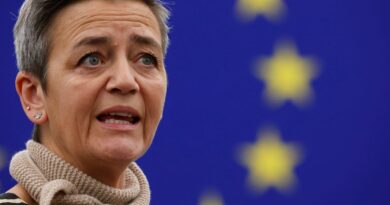Fossil fuels still ‘elephant in the room’ as COP28 chief lays out plan
The COP28 presidency’s long-awaited plan for this year’s climate summit in Dubai spotlights renewables but sidesteps questions over the role of fossil fuels.
With less than five months until the conference kicks off, COP28 President Sultan Al-Jaber has come under increasing pressure to outline a clearer vision for the talks.
On Thursday, during a visit to Brussels, the embattled COP leader finally presented an agenda — a plan that was widely welcomed as a step forward but criticized for its muddled message on fossil fuels.
“Today, I am calling on all of us to disrupt business as usual, unite around decisive action and achieve game-changing results,” Al-Jaber told officials attending the annual Ministerial on Climate Action, a conference co-convened by the EU, Canada and China.
Calling on countries to engage in “brutally honest” negotiations at the summit, Al-Jaber said his plan was “guided by a single north star, and that is keeping 1.5C within reach.”
He outlined four pillars for the conference, which starts on November 30: “Fast-tracking the [energy] transition, fixing climate finance, focusing on people, lives and livelihoods, and underpinning everything with full inclusivity.”
Stressing the importance of speeding up the deployment of renewables, Al-Jaber called on countries to join efforts to triple the world’s renewable energy capacity to 11,000 gigawatts and double energy efficiency by 2030.
“We must be laser-focused on building the energy system of the future. A system free of unabated fossil fuels, including coal, using all available technologies,” he said, describing a fossil fuel phasedown as “inevitable” and “essential.”
Al-Jaber — who serves as chief executive of the United Arab Emirates’ state oil company — also insisted that to tackle both demand and supply of fossil fuels, it was critical to involve major energy companies in the talks, adding that he would convene dialogues between industry players, governments, the U.N. and international energy agencies.
Critics noted the presidency’s plans contained few details and that references to “unabated” emissions and technologies like carbon capture signaled the UAE wasn’t yet ready to give up on fossil fuels.
“Renewables and efficiency targets would be an important success for the UAE,” said Lisa Fischer, a senior energy systems analyst at think tank E3G. “But phasing out fossil fuels is the elephant in the room for them … success will require them engaging with the fact of the inevitable decline of fossil fuel use.”
Still TBD
Calls to phase out fossil fuel subsidies, which featured in the COP26 agreement, were absent. There was also no clear indication of how the UAE intends to achieve its goals.
In an interview with POLITICO, COP28 director-general Majid Al Suwaidi said there was no firm plan on what form the renewables or efficiency targets should take. The EU advocates only for a voluntary pledge, for example.
“We’ve put it on the table … what form that takes is up to the parties to figure out what they can agree to,” he said.
Similarly, regarding action on a fossil fuel phasedown, “what form that takes in the final agreement is really up to the parties,” he added.
On climate finance, Al-Jaber called on rich countries to “honor the commitments of the past to rebuild trust in the future” and provide additional financing, particularly to help developing nations prepare for the impacts of climate change.
He also said COP28 would aim to deploy a functional fund to compensate vulnerable countries for climate damages. Western diplomats have suggested doing so might take years.
While industry will be involved in talks to reduce emissions, Al Suwaidi said the UAE “hadn’t considered” asking for private sector action on compensation for climate damages, known as loss and damage in negotiations.
“Our goal is to deliver on loss and damage what was mandated for us from [COP27] … and that’s operationalization of the fund,” he said. “The key thing for us is to get it up and running.”
First assessment
Countries should also update their national climate plans by September, Al-Jaber said. The UAE has just sent in a new version of its own plan, which nonprofit Climate Action Tracker described as “an improvement” but insufficient as the country still plans to expand its fossil fuel production capacity.
COP28 will feature the U.N.’s first formal assessment of progress toward reducing emissions in line with the Paris Agreement, dubbed the Global Stocktake. The process is widely expected to identify significant shortfalls.
Al-Jaber said he had appointed climate ministers Barbara Creecy of South Africa and Dan Jørgensen of Denmark to coordinate talks on how to respond to the assessment’s outcome.
Speaking to ministers after Al-Jaber, U.N. climate chief Simon Stiell laid out his own wish list for the summit.
“We must do address head-on difficult issues such as fossil fuel subsidies, the phasedown of coal and addressing other fossil fuels,” he said. “We will leave fossil fuels in their own dust as renewables take center stage.”
EU climate chief Frans Timmermans, meanwhile, said the bloc would push for a phaseout of “unabated fossil fuels well ahead of 2050.”



